In Japanese, tsukkomi ツッコミ means "retort." In manzai 漫才 comedy, in a boke and tsukkomi routine performed by a duo of comedians, the boke ボケ is the idiot doing or saying something ridiculous, while the tsukkomi is the "straight man" who retorts, reacting to, pointing out, or calling out the ridiculousness of the boke for the audience. For example:
Right: Nakano Azusa 中野梓
Anime: K-On!!, Keion!! けいおん!! (Season 2) (Episode 9)
- Context: Yui and Azusa do a manzai bit in front of an audience. Yui says:
- watashi no hou ga senpai desu ga, Azu-nyan no hou ga chakkari shiteru-n-desu yo
私の方が先輩ですが、あずにゃんの方がちゃっかりしてるんですよ
Even though I'm the [older] one, it's Azu-nyan who is chakkari! - Hitting Yui with a harisen ハリセン, Azusa says:
- sore wo iu nara "shikkari" da!
それを言うなら「しっかり」だ!
If [you] are going to say that, [it] is "shikkari"!- This is a tsukkomi on Yui saying a common phrase wrongly.
- shikkari shite-iru
しっかりしている
To be holding together well.
To be responsible, mature, in the sense of having one's life in order, of not being lax. To be dependable. (something you'd expect from someone older.) - chakkari
ちゃっかり
Shrewd, in the sense of never missing a chance to profit from a situation.
Often, the boke is an unpredictable, random, crazy character that completely lacks common sense, and is complemented by a more logical, grounded-on-reality tsukkomi character, who is there to provide a sane point of view in the comedy and try to insert some common sense in the show.
Meaning
The word tsukkomi 突っ込み is the noun form of the godan verb tsukkomu 突っ込む, which is composed by two morphemes:
- tsuku
突く
To thrust. - komu
込む
To pack into. To cram into.
Literally, tsukkomu means "to thrust [something] into [something else]," but it can be used in various ways, like:(kotobank.jp:突っ込む)
- To enter into something with force, or to put something somewhere with force. To plunge into. To crash into. To shove into.
- To enter deeply into a topic. To delve into. To pressure someone, to grill them, to question them sharply about something they can't defend well. By extension, to make a retort in manzai, typically by questioning the boke.
- {aimai na} setsumei wo shite yatou ni tsukkomareru
あいまいな説明をして野党に突っ込まれる
To be pressed on by the opposition party after making a {vague} explanation.
- {aimai na} setsumei wo shite yatou ni tsukkomareru
- To put something into somewhere carelessly.
- poketto ni te wo tsukkomu
ポケットに手を突っ込む
To shove [your] hands into [your] pockets.
- poketto ni te wo tsukkomu
- .To be deeply involved with something. To meddle with. To butt in. To poke your nose in.
- tanin no mondai ni kubi wo tsukkomu
他人の問題に首を突っ込む
To shove [your] head into other people's problems. (literally.)
- tanin no mondai ni kubi wo tsukkomu
- To include all things together and think.
- chuukohin mo shinpin mo tsukkonde ne wo tsukeru
中古品も新品も突っ込んで値をつける
To price [things] considering secondhand products and new products, too.
- chuukohin mo shinpin mo tsukkonde ne wo tsukeru
The tsukkomi this article is mainly about is the sense of questioning things.
In manzai, tsukkomi also refers to the PERSON that does the tsukkomi, the "retorter," besides the "retort" itself.
- tsukkomi-yaku
ツッコミ役
tsukkomi role.
Someone whose role is doing the tsukkomi.- In English, this is called the "straight man," in the sense of "straight" as "serious," not in the sense of heterosexual.
- boke-yaku
ボケ役
boke role.
Someone whose role is doing the boke.
By the way, boke ボケ can be used as a verb, too:
- bokeru
ボケる
To do a boke.
To say something something stupid, ridiculous, etc.
For reference, an example of manzai in real life:
And some comedy-related terms:
- owarai
お笑い
Laugh. (literally.)
Comedy. (as in "to do comedy.") - konbi
コンビ
A duo of comedians. From "combination." - neta
ネタ
The content which an article, story, play, show, etc. is written based on, e.g. the neta of a news story is what happened, the neta of a joke is what the joke is about. - ochi
オチ
"Drop." The punchline of a joke.
There are two types of tsukkomi:
- A tsukkomi on something ridiculous that someone said or did.
- A tsukkomi on a ridiculous present situation.
In manzai, and comedy based on this boke-tsukkomi system, an idiot (the boke-yaku) says or does something stupid (the boke), and the straight man (the tsukkomi-yaku) does the retort (the tsukkomi).
This occurs because the audience can't do the tsukkomi.
If a comedian says something stupid, and the audience is like: "what? That's stupid!" The audience can't actually SAY that to the comedian. There are countless people in the audience. We can't have all of them doing a tsukkomi in unison every time the comedian does a boke.
But if they don't do a tsukkomi, who will? Because SOMEONE has to tell him that's all wrong and stupid. There's an urge to correct the wrong and we won't be satisfied until SOMEONE says something. The tsukkomi-yaku is there to be this someone.
Comedy manga and anime aren't technically manzai, but follow the same principle, and a tsukkomi can be pretty much anything, even just noting it. For example:
- Context: Aioi Yuuko 相生祐子 always does a tsukkomi when Minakami Mai 水上麻衣 does a boke, however, feeling this isn't a proper relationship for two high school girls to have, Yuuko decides she won't do a tsukkomi anymore, no matter what happens, prompting Mai to do even stupider boke's, like coming to school wearing two glasses, and looking for her glasses on the floor as if she had lost them while still wearing both of them.
- nani kono {hai-peesu na} boke...
なにこのハイペースなボケ・・・
What is this {high-paced} boke... - marude {watashi no tsukkomi wo matteru} ka no you na......
まるで私のツッコミを待ってるかのような・・・・・・
It's as if {[she] is waiting for my tsukkomi}...... - dame! {tsukkondara} dame yo!!
ダメ!ツッコんだらだめよ!!
[Don't do it]! {If [you] make a retort} [you lose]!! - nanda yo, Minakami
なんだよ水上
[What's wrong], Minakami. - ni-ko mo megane shite-n-jan
2コもメガネしてんじゃん
You're wearing two glasses.- shite-n-jan - contraction of shite-iru no dewanai しているのではない.
- hahaha
ハハハ
*laughs* - Tanaka no yaroo!!!
田中のヤロー!!!
Tanaka, [you bastard]!!!- See also: cat eyes.
- watashi no tsukkomi wo......
私のツッコミを・・・・・・
My tsukkomi...... - {watashi dake ni yurusareta} saikou no tsukkomi wo!!!
私だけに許された最高のツッコミを!!!
The greatest tsukkomi [that] {was only allowed to me}!!! (literally.)
- In the sense of "only I, and not anyone else, was allowed to make a retort, how dare you take that from me!"
- boku'
ボクッ
*pencil snapping.* - ha'
はっ
Hah! (her snapping back from a moment of utter jealously.) - iya chigau chigau
いやちがうちがう
No, [that's wrong, that's wrong]. - watashi-n-janai
私んじゃない
[It] isn't mine.- Contraction of watashi no janai.
- sore wa watashi no tsukkomi janai kara!!
それは私のツッコミじゃないから!!
That's not my tsukkomi!!- In this scene, Yuuko resisted the urge to do an epic tsukkomi on Mai's boke, allowing Tanaka to do a pretty weak tsukkomi on it before her: "you're wearing two glasses, hahaha."
Often, the tsukkomi will have a phrase like wake nai わけない, meaning "there's no way that..." For example:
- Context: Sakata Gintoki 坂田銀時 being the boke ボケ for Shimura Shinpachi's 志村新八 tsukkomi ツッコミ.
- sou... karushiumu da
そう・・・カルシウムだ
[That's right]... calcium. - {karushiumu sae tottokya} subete φ {umaku} iku-n-da yo
カルシウムさえとっときゃ全てうまくいくんだよ
{If [you] just took calcium}, everything would go {well}, [you see].
All you need to do is ingest calcium, and everything will go well.
- tottokya - contraction of totte-okeba とっておけば.
- ichigo gyunyuu
いちご牛乳
Strawberry cow-milk. - juken sensou, oya to no kakushitsu, {ki ni naru} ano ko
受験戦争 親との確執 気になるあの娘
The exam war, discord with [your] parents, that girl [that] {[you] are interested into}.- Exam war refers to university entrance exams and the competition surrounding it.
- toriaezu {{karushiumu tottokya} subete φ {umaku}...
とりあえずカルシウムとっときゃ全てうまく・・・
Anyway {if [you] take calcium} everything [will go] {well}... - iku} wake φ nee daro!!
いくわけねーだろ!!
[There's no way that's true]!!- There's no way to translate the phrases above literally, because one completes the other, and the first one ends in the adverb umaku, "well."
- subete ga {umaku} iku
すべてがうまくいく
Everything will go {well}. (what Gintoki intended to say.) - {subete ga {umaku} iku} wake ga nai
すべてがうまくいくわけがない
There's no way [that] {everything will go {well}}. (how Shinpachi completed the sentence.)
- {ikura karushiumu tottetatte} naa, {kuruma ni hanerarerya} hone mo oreru wa!!
幾らカルシウムとってたってなァ車にはねられりゃ骨も折れるわ!!
{No matter how much calcium [you] take}, [you see], {if [you] get hit by a car} [your] bones break!!- ~tatte ~たって - same as ~temo ~ても.
- hanerarerya - contraction of hanerarereba はねられえば, ba-form of passive form of:
- haneru
跳ねる
(For a car) to hit [someone].
All tsukkomi is a reaction to a boke for an audience. In real life, this is always done by words and actions, but in fiction it can also be done with thoughts, since the audience, the readers of a manga, can read the tsukkomi in a thought bubble, for example.
Of course, the characters in-universe can't read thoughts, so the characters themselves wouldn't call it a tsukkomi, but as a comedy work, it's pretty much one.
- Context: a robot confesses his weakness.
- ore φ-- {kikai φ nigate nanda yo}
オレーー機械苦手なんだよ
I'm {not good with machines}.
- nigate
苦手
To have trouble handling [something]. To not be good with [something].
- nigate
- ....na wake φ nee daro!!
・・・・なワケねーだろ!!
- sonna wake φ nai daro!!
そんなわけないだろ!!
There's no way something like that is true!! - This is a beta flash-style thought bubble.
- sonna wake φ nai daro!!
There are also cases where a character will monologue doing both the boke and tsukkomi, for example by saying "as if something like that would happen" after thinking something.
- jibun de bokete jibun de tsukkomu
自分でボケて自分で突っ込む
To boke yourself, then to tsukkomi yourself.
To do both the boke and tsukkomi yourself.
Another word commonly used in tsukkomi is the ~tte ~って particle when it's used in the sense of "wait a second," "or rather," more importantly," specially together with an emotive right dislocation like nani kore なにこれ, and dare da omae だれだお前.
Right: Alba, アルバ
Anime: Sen'yuu. 戦勇。 (Episode 7)
- Context: Ruki thinks Alba didn't do anything the last battle, then Alba tells her she wasn't paying attention, reminding her of his heroic feats. Convinced, she says:
- sou da na, Aruba-kun mo ganbatta ne
そうだな、アルバくんも頑張ったね
[That's right], Alba-kun worked hard, too, huh. - *her overly long sleeves extend monstrously revealing her hand so she can head pat him.*
- arigatou Ruki.. tte nani kore!? ude dou natte-n-no!?
ありがとうルキ・・って何これ!?腕どうなってんの!?
Thank you, Ruki.. [wait], what is this!? [What is going on with] [your] arm!?
- dou natte-n-no - contraction of dou natte-iru no どうなっているの, literally "what has [it] become."
Note that a tsukkomi is also a retort, a comment on something. Simply reacting to something stupid, like facepalming, doesn't count as a tsukkomi. The following reactions seen in manga aren't tsukkomi either:
- A lightning background effect, used when characters are shocked.
- Fully white eyes, in particular when accompanied by the phrase osoroshii ko 恐ろしい子.
- Making corna/ILY signs with hands. See rumic sign for details.
- Falling on the floor or losing balance out of nowhere, used when something stupid happens.
- Context: a character evades a punch by jumping and doing a flip backwards, but falls into a trash can, falling to stick the landing. The attacker is drawn tripping forward, losing balance. This sort of reaction isn't a tsukkomi.
It's important to consider what IS to be stupid.
Something is stupid when it's nonsense, when it deviates from common sense, and common sense, as the term implies, is a basic understanding of everything that everyone shares in common, except it's never really "everyone," it's just a given group of people.
To do a boke right you need to understand what's the common sense of the audience and deliberately go against this common sense, which is a deep, philosophical matter if you waste time thinking about it.
Nobody questions something that is normal, you only do a tsukkomi on something that is stupid.
This means that if nobody questions it, it's because it's normal.
If nobody does a tsukkomi on it, it's because there's nothing wrong with it.
- Context: a dog surrounded by fire doesn't tsukkomi the fire.
You could go crazy if there's something obviously wrong but nobody does a tsukkomi on it, which sounds unlikely in real life, but not impossible in fiction.
- The term "to gaslight," meaning "to manipulate someone into doubting their sanity," is related to this in principle. It comes from the title of a play, Gas Light, in which a husband, among other things, dims a gas light but acts as if it isn't dimmed, trying to make his wife go crazy.
For example, imagine the following scenario:
- Context: there's a bear in the room.
- Everybody calls him "Sir Bearington" and acts as if he's just another dude. All he does is growl and roar. He has a butler.
- Are they ALL gone crazy for thinking the bear is a person?
- Or are YOU the crazy one for thinking the person is a bear?
- Perplexed, you decide to do the tsukkomi yourself, and say: "wait, that's a bear!"
- The guards escort you out for the impudence of calling Sir Bearington a bear.
Above, it's "common sense" FOR THE CHARACTERS that Sir Bearington is a person. FOR THE AUDIENCE (you), viewing the scene through a (possibly unreliable) first-person narration, Sir Bearington is a bear.
Thus comes the question: when you called Sir Bearington a bear, did you do a tsukkomi or a boke?
In your mind, and in the mind of the audience, which is the one that matters, you did a tsukkomi, but in-universe, where it's common sense that Sir Bearington is clearly not a bear, that was a boke.
You can also have a situation where a character THINKS something is a common sense and does a tsukkomi, but neither other characters nor the audience shares their sense, so for everyone, specially for the audience, it's a boke.
- Context: Honda Hanako 本田華子 asks the student council president to listen to her objection about why the shōgi 将棋 club shouldn't get to use the classroom that they've been occupying to play games and fool around.
- shougi, also romanized shōgi, is a board game.
- hai douzo
はいどうぞ
Okay, [say it].- douzo - used to say someone is free to do something.
- shoogi tte {oshiri kara biimu φ dasu} ano kyougi da shi, {kyoushitsu de yaru} niwa kiken janai desu ka!?
ショーギってお尻からビーム出すあの競技だし 教室でやるには危険じゃないですか!?
Shogi is that game [where] {[you] fire a beam from [your] butt}, so [it] would be dangerous {to do [it] in a classroom}, wouldn't [it]? - *everybody stares confused*
- Hanako, mou yasunde-ii yo
華子 もう休んでいいよ
Hanako, [you] can rest already. (because you're so tired you're talking nonsense.) - are? nani-ka machigaechatta?
あれ?何か間違えちゃった?
Huh? Did [I] [say] something wrong?- ~chatta - contraction of ~te-shimatta ~てしまった.
- Hanako-san no atama no naka niwa sonna kyougi ga aru no?
華子さんの頭の中にはそんな競技があるの?
Inside [her] head, a game like that exists?
Hand Gesture
A common way to do a tsukkomi involves hitting the boke with a backhand slap on the chest.
Right: Kitakaze Fubuki 北風ふぶき
Anime: Maesetsu! まえせつ! (Episode 1)
Sometimes, this is done on air instead.
- Context: Suzuki Iruma 鈴木入間 makes Valac Clara ウァラク・クララ sit on his lap in class. The entire class stares at them. In response, Iruma says:
- nanda yo
なんだよ
What is [it]?
[What are you looking at]? - mise-mon janee zo
見せもんじゃねーぞ
[This] isn't a show.- mise-mon - contraction of mise-mono 見せ物, a "thing," mono, that you "show," miseru, others.
- pii
ぴー
*head smoke noises* - Hearing this, Andro M. Jazz アンドロ・ジャズ retorts, making a gesture slapping the air:
- iya, {dou mitemo} mise-mon daro
いや どうみても見せもんだろ
No, {no matter how you look at [it]} [it] is a show.
- iya - "no" in the sense of "no, what you said is wrong:" this is clearly a show, and you're obviously doing it in front of everybody for everybody to see it.
harisen
A harisen 張り扇 is a large white paper fan used to physically hit the boke in a tsukkomi.
Middle: Tanahashi Suzune 棚橋鈴音
Right: Maki Natsuo 真木夏緒
Anime: Love Lab, Ren'ai Rabo 恋愛ラボ (Episode 2)
- Context: Riko, angered by Natsuo's stupidity, hit her on the head with a harisen, giving her a head bump.
For the record, a normal fan is called a sensu 扇子 instead, and a "fan" as in someone who likes something is katakanized fan ファン.
Shirasaka Koume 白坂小梅
Fujiwara no Sai 藤原佐為
Kogami Akira 小神あきら
Uraha 裏葉
Ruki ルキ
Shuna シュナ
Anime: The iDOLM@STER Cinderella Girls, アイドルマスター シンデレラガールズ (Episode 8)
Anime: Hikaru no Go ヒカルの碁 (Episode 1)
Anime: Lucky☆Star, らき☆すた (Episode 1)
Anime: AIR (Episode 8)
Anime: Sen'yuu. 戦勇。 (Episode 3)
Anime: Tensei shitara Slime Datta Ken, 転生したらスライムだった件 (Episode 9)
- Context: characters hiding their mouths with overly long sleeves and with sensu.
Other objects can be used like a harisen to hit the boke.
Right: Tomoe 巴
Anime: Tsuki ga Michibiku Isekai Douchuu 月が導く異世界道中 (Episode 3)
- Context: Makoto hits Tomoe with a rolled up book for saying something silly.
- See also: Rumic sign for the corna-like hand sign Tomoe is doing as she flies away.
Kansai
The Kansai 関西 region of Japan is associated with manzai. As such, it's a trope for a Kansai character to do tsukkomi as if it the show was a manzai all the time.
- Context: there is a transfer student coming from Ōsaka.
- Oosaka-jin~~!
大阪人ーー!
An Osakan! - kitto sugoi tsukkomi toka soubi shiteru ni chigai-nai!
きっとすごいツッコミとか装備してるに違いない!
There's no doubt [she] [brings with her] an incredible tsukkomi and stuff like that.- soubi suru
装備する
To equip. (e.g. a weapon, except in this case the weapon is a tsukkomi.)
- soubi suru
- dou taisho sureba!?
どう対処すれば!?
How should [I] deal with [it]? - sonna no kangaenakutemo....
そんなの考えなくても・・・・
Even if [you] don't think about something like that [it will be fine]....
You don't need to think about something like that....
nandeyanen
The phrase nandeyanen なんでやねん means "why" in Kansai dialect, and it's popularly associated with tsukkomi.
- Context: a training arc.
- chotto "nandeyanen" tte tsukkonde!
ちょっと「なんでやねん」ってつっこんで!
[Try] doing a tsukkomi [saying] "why"! - e...?
え・・・?
Eh...? - nandeyanen...
なんでやねん・・・
Why... - gata gataaa
ガタガターー
*sound of chairs and desks falling* - guhaaa'
ぐはーーっ
Aaargh!! - {kore kurai hade ni uketa} hou ga ii ka na?
これくらいハデに受けた方がいいかな?
[Do you think] [it] would be better if [I] received [the tsukkomi] [reacting] this much showy? (literally.)- hade
派手
Showy. Gaudy. - Do you think I should react this extravagantly?
- hade
- nandeyanen
なんでやねん
Why.
References
- 突っ込む - kotobank.jp, accessed 2021-06-24.
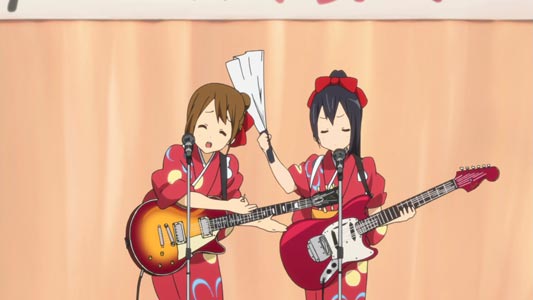
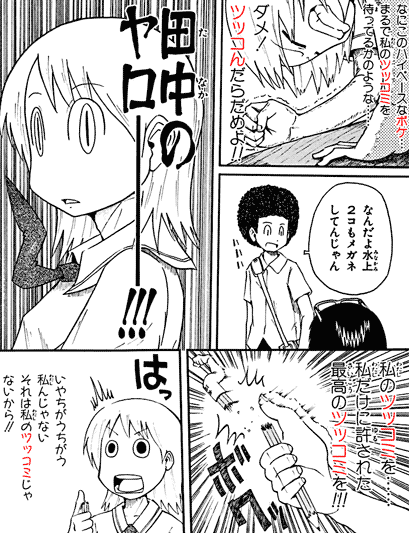
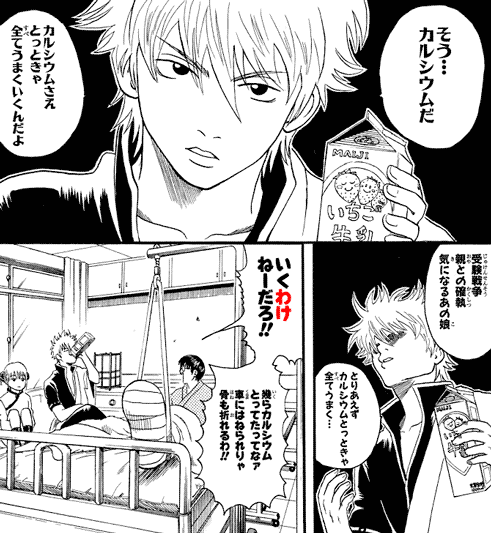
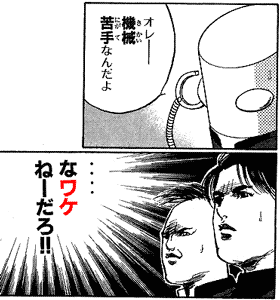
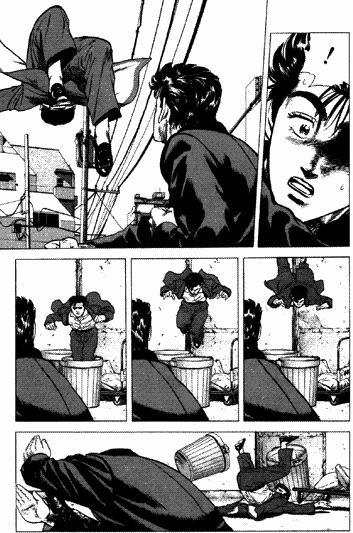
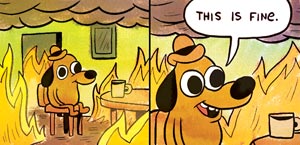
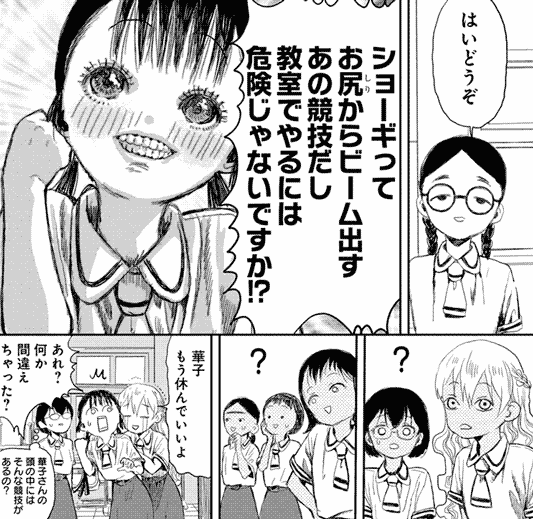


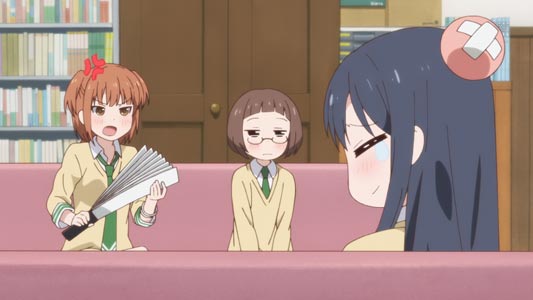
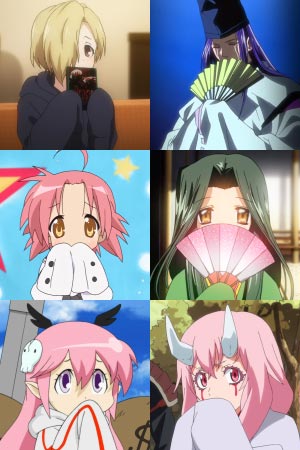
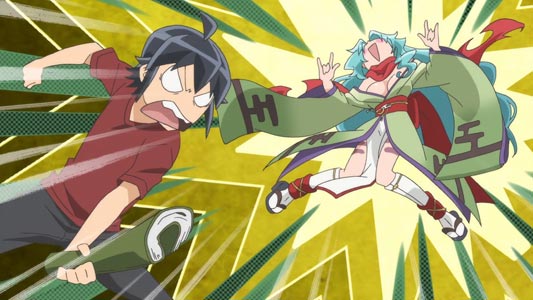

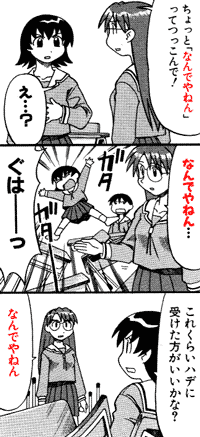
No comments: